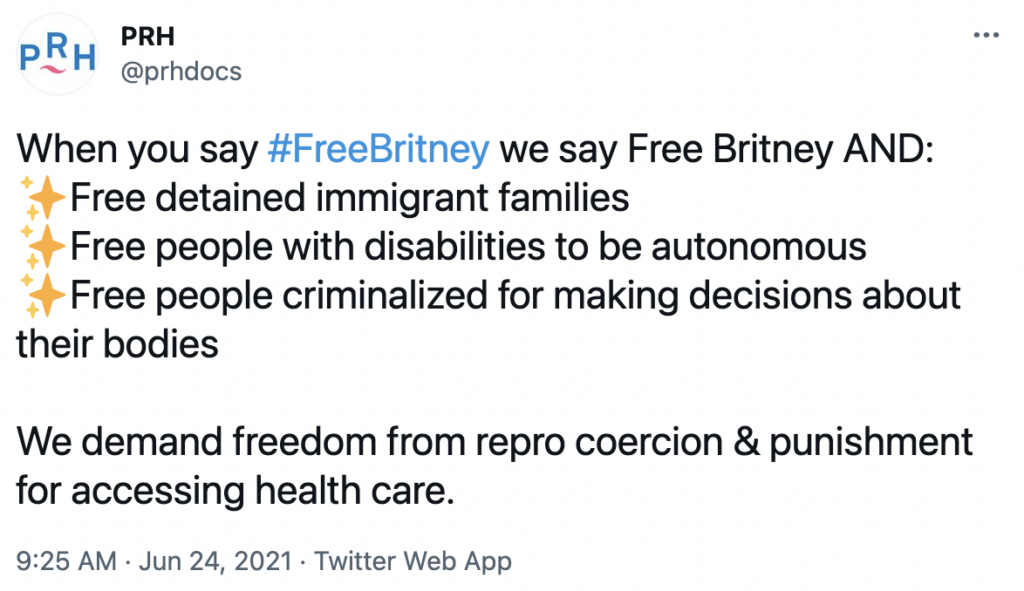By now, most of us have heard of the #FreeBritney movement. It started a few years after the singer, Britney Spears, was placed under a legal conservatorship. A conservatorship is an arrangement where someone, known as a guardian or conservator, is given the legal authority to makes decisions for a person. These types of arrangements are intended to be used as a last resort when someone can no longer take care of themselves. Unfortunately, it’s an imperfect tool, and it can open the door for folks to be abused, coerced, and to have their autonomy taken away from them.
On June 23rd, after years of not being given an opportunity to speak for herself publicly, Britney was finally given an opportunity to tell a Los Angeles judge what was happening to her. She told the judge that her conservators had drugged her, compelled her to work against her will, and that she had been forced to have an IUD and prevented from removing the birth control device for the past 13 years. She said, “I want to be able to get married and have a baby. I was told right now in the conservatorship I am not able to get married and have a baby.”
Make no mistake – this is reproductive coercion. And it’s something that people of color and people with disabilities have been sounding the alarm on for hundreds of years. This reproductive coercion is steeped in our nation’s history and in the evolution of much of our medical system.
Black women, AAPI women, Latinx women, Indigenous Women, and communities of color have been subject to reproductive coercion for centuries. Black women who were enslaved were forced to have children and were forcibly separated from their families. Puerto Rican women were given experimental birth control without their consent. Indigenous people were forcibly sterilized. Women of color who were incarcerated were forcibly sterilized. People trying to access Medicaid coverage were forcibly sterilized.
The very development of the practice of obstetrics and gynecology was built on the reproductive coercion of Black women. The “father” of gynecology, J. Marion Sims, experimented on Black enslaved women without their consent and without pain management to develop surgical practices still used today.
This long pattern of discrimination, reproductive coercion, and abuse has continued to today, and is also present for people with disabilities and people who are incarcerated. People with disabilities are more likely to be denied decision-making around reproductive health care, particularly around sterilization, contraceptive use, and abortion. In addition, folks with disabilities face numerous barriers including a lack of physical access, lack of information specific to people with disabilities, and a lack of trained providers all of which prevent people from accessing the reproductive health care they need and denies them autonomous decision making.
People in carceral systems are particularly vulnerable to coercion as they are already in an environment where their autonomy is restricted. In California, 1400 incarcerated women, most of whom were Black, were forcibly sterilized between 1997 and 2003. As recently as 2008, while serving a prison sentence Kelly Dillon was told she needed a hysterectomy to treat her cervical cancer. There was no cancer, but at 24 years old, Kelly was sterilized. One of the doctors involved called these sterilizations “cheaper than welfare.” And we know incarcerated people have been coerced into using contraception in exchange for shorter sentences.
This is something we cannot stand for. Reproductive justice means that we must all be able to make decisions about our lives, our bodies, and our families with dignity, free from discrimination and free from coercion. As a network of providers and supporters we demand that all people of all abilities, of all races, of all insurance status, of all incomes, be able to make decisions about their bodies without the control of any other entity. We cannot be forced to be pregnant, we cannot be forced to be on birth control, we cannot be forced to be sterilized. We must be able to exercise the power of consent.
So when we say #FreeBritney we mean Free Britney AND:

By: Dr. Gabriela Aguilar, Fellow from the Leadership Training Academy Class of 2021
Kelsey Rhodes, Assistant Director, Voice
MiQuel Davies, Assistant Director, Public Policy
